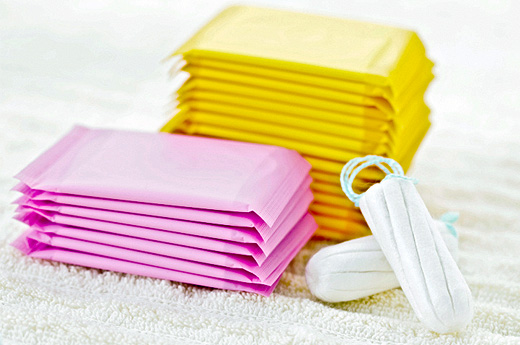
by guest blogger Cassidy Randall, director of outreach for Women’s Voices for the Earth
WARNING: We are about to delve into an intimate and maybe uncomfortable topic: toxic chemicals in feminine care products.
You’re probably thinking, “Seriously? Now I have to worry about toxic chemicals in THOSE, too?” The answer, unfortunately, is yes. (For now, anyway, before we convince the entire industry to clean up its act! And trust us, we will.)
Women’s Voices for the Earth’s (WVE’s) new report, “Chem Fatale: Potential Health Effects of Toxic Chemicals in Feminine Care Products,” examines unregulated toxic chemicals in feminine care products like pads, tampons, wipes, sprays, douche, and anti-itch creams. These chemicals are linked to some serious serious health problems, such as increased risk of breast cancer, reproductive problems, hormone disruption, and allergic reactions.
Women’s Health and Feminine Care Products
The majority of women in the U.S. use feminine care products in one form or another. Up to 86 percent use tampons, for example. Approximately 10 to 40 percent of women use douches, sprays, washes, and wipes. Black and Latina women use certain feminine products like douches, wipes, and sprays in greater numbers than white women, meaning these women are disproportionately impacted by the use of toxic chemicals in these products.
And the doozy: Doctors are increasingly administering hormone drugs vaginally because vaginal skin is some of the most absorptive tissue in women’s bodies, and because it goes into our bloodstream without having to metabolized first. And companies are using hormone-disrupting chemicals in products that come into contact with vaginal skin? Unacceptable.
Obviously, this is not an issue that comes up in everyday conversation. And because no one’s really talking about it, it means that no one’s minding the store to make sure that these products are getting the oversight they deserve to assure their safety for women’s health. At present:
- Pads and tampons are regulated as medical devices, which means that companies don’t have to disclose any ingredients in these products.
- Laws don’t require companies to disclosed fragrance ingredients. Unfortunately, a “fragrance” is a mixture of ingredients that can include any of more than 3,000 different chemicals, including carcinogens, irritants, allergens, and potential endocrine disruptors.
- Because of weak regulation, companies don’t have to prove the chemicals they’re using in these products are safe. So companies are legally allowed to use ingredients linked to cancer, birth defects, and other chronic diseases.
What’s Lurking in Feminine Care Products?
Here are just a few shocking facts from WVE’s report: Test results show dioxins, furans, and pesticide residues in tampons, chemicals that have been linked to cancer, reproductive harm, and endocrine disruption. Lots of feminine care products contain formaldehyde-releasing preservatives, and formaldehyde is a carcinogen and a potent allergen. The Food and Drug Administration considers common chemicals in feminine washes to be safe “for external use only.” However, it’s extremely likely that in using a feminine wash regularly, some internal exposure will occur. Anti-itch creams commonly contain chemicals that are either allergens or irritants, and can actually exacerbate the very symptoms that women are attempting to treat.
Tips for Reducing Your Exposure
- Avoid products included on our Hall of Shame list
- Print out WVE’s Chemicals of Concern list and take it with you when shopping
- Look for brands that list all ingredients, including what’s in a product’s fragrance
- Reduce your use of feminine care products
- Choose fragrance-free products where available (particularly tampons and pads)
- Choose chlorine-free bleached or unbleached cotton tampons and pads
- Eliminate use of products that may be unnecessary to a healthy vagina.
Click here for tips on finding safer alternatives and more ways to reduce your exposure to toxic chemicals in feminine care products.
Women have a massive amount of economic power to convince companies to make nontoxic feminine care products that list all ingredients—after all, we’re 100 percent of their market, right? Tampax and Always are two of the biggest sellers when it comes to pads and tampons. But Procter & Gamble keeps the ingredients in these products a secret, which is a serious problem when it comes to our most intimate parts. Join WVE in telling Procter & Gamble to list all ingredients and take toxic chemicals out of Tampax and Always. We deserve to know what’s in the products we choose.
Toxic chemicals have no place in pads and tampons. Period.

Cassidy Randall is the director of outreach and engagement for Women’s Voices for the Earth. She oversees WVE’s corporate campaigns and coordinates efforts to mobilize and engage women in WVE’s work. In addition, she develops the organization’s engagement tools and social media and leads WVE’s Actionista team.




Thank you for listing these chemicals that are dangerous and unnecessary for the products that include them. I have always been a label reader because I am sensitive to many substances and have, over the years, noticed a dramatic change in ingredients for cleaners, make-ups, feminine care products, deodorants, etc. toward using complex (even petro-(!)) chemicals, maybe to save costs? Make production easier? Provide profits to related chemical/oil companies? In any case, the more ingredients included and the farther they range from substances that you can actually find intact in nature, the more allergic reactions and problems I seem to have. Is the only solution DIY?
There are a number of excellent organic, unscented and toxin free brands of tampons and pads — they are available on amazon.com and at Whole Foods and local healthy supermarkets.
I turned to organic cotton products years ago after a friend had a very severe reaction and it was determined to be from chemicals in a tampon. Then I found a silicone menstrual cup and would never go back to tampons! It was awkward the first month but, once I got the hang of it, I could not believe how much better and more free I felt. Thought I would mention it for those who have never heard about them.
Toxic chemicals have no place in pads and tampons. Period.
I assume no pun intended?
And what about Poise pads and other brands of that type of product? Go to the comments on the Poise web site and you will see pages and pages of complains about terrible rashes caused by some kind of chemical (or chemicals) that have been added to these pads (not just Poise, as these comments attest) in the past couple of years. Many women are too embarrassed by having to wear incontinence pads to complain directly to retailers about this, and the companies seem to be less than forthcoming. This is truly horrific and outrageous.
http://community.poise.com/topic/Lbl-Products-Product/Allergy-New-Product/800000150?start=48&
Sorry, but this article is bogus. From the original research paper:
“… dioxins from tampons are approximately 13,000-240,000 times less than dietary exposures.”
It’s also 20,000 times less than the EPA no observed adverse effects limit.
Women’s Voices for the Earth are just trying to scare women into buying from their “Non-Toxic Shopping Guide”.
Follow the money!
I had used poise pads since I was about 40 years old. No problem. After about my second purchase of the new and improved Poise with S.A.M. I developed a problem that has really scared me. that was about six months ago. I tried the always bladder leakage pad and same thing.
I was wondering if these products contain latex as I know I do have an allergy to latex.
I have tried antibiotic cream and it started to dissipate. I purchased a menstrual pad and now I have a much worse inflammation.
is there any thing that I can use to clear up my problem. It hurts when I sit or try to lay down
I am at my wits end with this
When I wrote to poise a woman contacted me and assured me that there was nothing in the product that could cause this.
I then found a web site that I found a great many women were having the same sort of problems
Also I forgot to tell you that I just turned 61 so it has been 20 years for my LBI
HELP